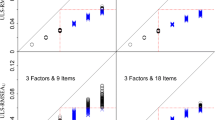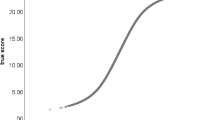Abstract
Using structural equation modeling, we found empirical support for the prevailing theory that subjective well-being consists of three domains: (1) cognitive evaluations of one’s life (i.e., life satisfaction or happiness); (2) positive affect; and (3) negative affect. Multiple indicators of satisfaction/happiness were shown to have strong convergent validity as well as discriminant validity from positive and negative affect. Positive and negative affect likewise exhibited discriminant validity from one another. At both the item and scale levels of analysis, we obtained an intercorrelated three-factor solution corresponding to the three proposed subjective well-being domains.
Similar content being viewed by others
References
H. Akaike (1987) ArticleTitle’Factor analysis and the AIC‘ Psychometrica 52 317–332
F. M. Andrews R. Crandall (1976) ArticleTitle’The validity of measures of self-reported well-being‘ Social Indicators Research 3 1–19 Occurrence Handle10.1007/BF00286161
F. M. Andrews A. C. McKennell (1980) ArticleTitle’Measures of self-reported well-being: Their affective cognitive, and other components‘, Social Indicators Research 8 127–155
F. M. Andrews J. P. Robinson (1991) ’Measures of subjective well being‘ J. P. Robinson P. R. Shaver L. S. Wrightman (Eds) Measures of Personality and Social Psychological Attitudes NumberInSeriesVol 1 San Diego Academic Press 61–114
F. M. Andrews S. B. Withey (1976) Social Indicators of Well-being: Americans‘ Perceptions of Life Quality New York Plenum Press
M. H. Benin W. A. Stock M. A. Okun (1988) ArticleTitle’Positive and negative affect: A maximum-likelihood approach‘ Social Indicators Research 20 165–175 Occurrence Handle10.1007/BF00302460
P. M. Bentler (1990) ArticleTitle’Comparative fit indexes in structural models‘ Psychological Bulletin 107 238–246 Occurrence Handle10.1037/0033-2909.107.2.238 Occurrence Handle2320703
N. M. Bradburn (Eds) (1969) The Structure of Psychological Well-being Chicago Aldine
M.W. Brown R. Cudeck (1993) Alternative ways of assessing model fit K. A. Bollen J. S. Long (Eds) Testing Structural Equation Models Sage Newbury Park, California 136–162
M. J. Burke A. P. Brief J. M. George L. Roberson J. Webster (1989) ArticleTitle’Measuring affect at work: Confirmatory analyses of competing structures with conceptual linkage to cortical regulatory systems‘ Journal of Personality and Social Psychology 57 1091–1102 Occurrence Handle10.1037/0022-3514.57.6.1091 Occurrence Handle2614660
B. M. Byrne (1998) Structural Equation Modeling with LISREL, PRELIS, and SIMPLIS: Basic Concepts, Applications, and Programming Lawrence Erlbaum Associates Mahway, N.J.
A. Campbell P. E. Converse W. L. Rodgers (1976) The Quality of American life: Perceptions, Evaluations, and Satisfactions Russell Sage Foundation New York
L. A. Clark D. Watson (1988) ArticleTitle’Mood and the mundane: Relations between daily life events and self-reported mood‘ Journal of Personality and Social Psychology 54 IssueID2 296–308 Occurrence Handle10.1037/0022-3514.54.2.296 Occurrence Handle3346815
G. L. Clore A. Ortony M. A. Foss (1987) ArticleTitle’The psychological foundations of the affective lexicon‘ Journal of Personality and Social Psychology 53 751–766 Occurrence Handle10.1037/0022-3514.53.4.751
K. J. Crooker J. P. Near (1998) ArticleTitle’Happiness and satisfaction: Measures of affect and cognition‘ Social Indicators Research 44 195–224
E. Diener (1994) ArticleTitle’Assessing subjective well-being: Progress and opportunities‘ Social Indicators Research 31 103–157 Occurrence Handle10.1007/BF01207052
E. Diener R. A. Emmons (1985) ArticleTitle’The independence of positive and negative affect‘ Journal of Personality and Social Psychology 47 IssueID5 1105–1117
E. Diener R. A. Emmons R. J. Larsen S. Griffin (1985a) ArticleTitle’The Satisfaction with Life Scale‘ Journal of Personality Assessment 49 IssueID1 71–75
E. Diener A. Iran-Nejad (1986) ArticleTitle’The relationship in experience between various types of affect‘ Journal of Personality and Social Psychology 50 IssueID5 1031–1038 Occurrence Handle10.1037/0022-3514.50.5.1031
E. Diener R. J. Larsen S. Levine R. A. Emmons (1985b) ArticleTitle’Intensity and frequency: Dimensions underlying positive and negative affect‘ Journal of Personality and Social Psychology 48 IssueID5 1253–1265 Occurrence Handle10.1037/0022-3514.48.5.1253
E. Diener R. E. Lucas (2000) Subjective emotional well-being M. Lewis J. M. Haviland (Eds) Handbook of Emotions EditionNumber2 Guilford New York 325–337
E. Diener E. Sandvik W. Pavot D. Gallagher (1991) ArticleTitle’Response artifacts in the measurement of subjective well-being‘ Social Indicators Research 24 35–56 Occurrence Handle10.1007/BF00292649
E. Diener H. Smith F. Fujita (1995) ArticleTitle’The personality structure of affect‘ Journal of Personality and Social Psychology 69 IssueID1 130–141 Occurrence Handle10.1037/0022-3514.69.1.130
E. Diener E. Suh S. Oishi (1997) ArticleTitle’Recent findings on subjective well being‘ Indian Journal of Clinical Psychology 24 25–41
M. W. Fordyce (1988) ArticleTitle’A review of research on the Happiness Measures: A sixty second index of happiness and mental health‘ Social Indicators Research 20 355–381 Occurrence Handle10.1007/BF00302333
C. Fornell D. F. Larcker (1981) ArticleTitle’Evaluating structural equation models with unobservable variables and measurement error‘ Journal of Marketing Research 18 39–50
D. P. Green S. L. Goldman P. Salovey (1993) ArticleTitle’Measurement error masks bipolarity in affect ratings‘ Journal of Personality and Social Psychology 64 IssueID6 1029–1041 Occurrence Handle10.1037/0022-3514.64.6.1029 Occurrence Handle8326466
G. Gurin J. Veroff S. Feld (1960) American‘s View of their Mental Health New York Basic
J. Horley B. R. Little (1985) ArticleTitle’Affective and cognitive components of global subjective well-being measures‘ Social Indicators Research 17 189–197 Occurrence Handle10.1007/BF00302421
T. J. Huelsman R. C. Nemanick SuffixJr D. C. Munz (1998) ArticleTitle’Scales to measure four dimensions of dispositional mood: Positive energy, tiredness, negative activation, and relaxation‘ Educational and Psychological Measurement 58 IssueID5 804–819
K. G. Joreskog D. Sorbom (1984) LISREL-VI User‘s Guide EditionNumber3 Scientific Software IN:Morresville
T. A. Judge C. J. Thoresen J. E. Bono G. K. Patton (2001) ArticleTitle’The job satisfaction-job performance relationship: A qualitative and quantitative review‘ Psychological Bulletin 127 376–407 Occurrence Handle10.1037/0033-2909.127.3.376 Occurrence Handle11393302
R. B. Kline (1998) Structural Equation Modeling The Guilford Press New York
R. J. Larsen E. Diener R. A. Emmons (1985) ArticleTitle’An evaluation of subjective well-being measures‘ Social Indicators Research 17 1–17 Occurrence Handle10.1007/BF00354108
T. D. Little W. A. Cunningham G. Shahar K. F. Widaman (2002) ArticleTitle’To parcel or not to parcel: Exploring the question weighing the merits‘ Structural Equation Modeling 9 IssueID2 151–173 Occurrence Handle10.1207/S15328007SEM0902_1 Occurrence HandleMR1884368
R. E. Lucas E. Diener E. Suh (1996) ArticleTitle’Discriminant validity of well-being measures‘ Journal of Personality and Social Psychology 71 IssueID3 616–628 Occurrence Handle10.1037/0022-3514.71.3.616 Occurrence Handle8831165
F. Luthans (2002) ArticleTitle’Positive organizational behavior: Developing and managing psychological strengths‘ Academy of Management Executive 16 57–75
R. C. MacCallum K. F. Widaman S. Zhang S. Hong (1999) ArticleTitle’Sample size in factor analysis‘ Psychological Methods 4 84–99 Occurrence Handle10.1037/1082-989X.4.1.84
V. Nowlis (1965) ’Research with the mood adjective check list‘ S. S. Thomkins C. E. Izard (Eds) Affect Cognition and Personality Springer New York 352–389
J. C. Nunnally (1967) Psychometric Theory McGraw-Hill New York
S. Oishi E. F. Diener R. E. Lucas E. M. Suh (1999) ArticleTitle’Cross-cultural variations in predictors of life satisfaction: Perspectives from needs and values‘ Personality and Social Psychology Bulletin 25 IssueID8 980–990
D. W. Organ J. P. Near (1985) ArticleTitle’Cognition versus affect in measures of job satisfaction‘ International Journal of Psychology 20 241–253
W. Pavot E. Diener (1993) ArticleTitle’The affective and cognitive context of self-reported measures of subjective well-being‘ Social Indicators Research 28 1–20 Occurrence Handle10.1007/BF01086714
W. Pavot E. Diener C. R. Colvin E. Sandvik (1991) ArticleTitle’Further validation of the Satisfaction with Life Scale: Evidence for the cross-method convergence of well-being measures‘ Journal of Personality Assessment 57 IssueID1 149–161 Occurrence Handle1920028
P. M. Podsakoff D. W. Organ (1986) ArticleTitle’Self-reports in organizational research: Problems and prospects‘ Journal of Management 12 IssueID4 531–544
J. S. Rain I. M. Lane D. D. Steiner (1991) ArticleTitle’A current look at the job satisfaction/life satisfaction relationship‘ Human Relations 44 287–307 Occurrence Handle10.1177/001872679104400305
R. W. Rice J. P. Near R. G. Hunt (1980) ArticleTitle’The job satisfaction-life satisfaction relationship: a review of empirical research‘ Basic and Applied Social Psychology 1 37–64
D. Rindskopf T. Rose (1988) ArticleTitle’Some theory and applications of confirmatory second-order factor analysis‘ Multivariate Behavioral Research 23 51–67
E. Sandvik E. Diener L. Seidlitz (1993) ArticleTitle’Subjective well-being: the convergence and stability of self-report and non-self-report measures‘ Journal of Personality 61 IssueID3 317–342
H. A. Simon (1982) Comments M. S. Clark S. T. Fiske (Eds) Affect and cognition: The Seventeenth Annual Carnegie Symposium on Cognition Lawrence Erlbaum Hillsdale, NJ 333–342
R. E. Thayer (1986) ArticleTitle’Activation-deactivation adjective check list: Current overview and structural analysis‘ Psychological Reports 58 607–614
R. Veenhoven (1986) Happiness in Nations: Subjective Appreciation of Life in 56 Nations RISBO Rotterdam 1946–1992
P. Warr J. Barter G. Brownbridge (1983) ArticleTitle’On the independence of positive and negative affect‘ Journal of Personality and Social Psychology 44 644–651 Occurrence Handle10.1037//0022-3514.44.3.644
D. Watson (1988) ArticleTitle’Intraindividual and interindividual analyses of positive and negative affect: Their relation to health complaints perceived stress, and daily activities‘, Journal of Personality and Social Psychology 54 IssueID6 1020–1030
D. Watson L. A. Clark A. Tellegen (1988) ArticleTitle’Development and validation of brief measures of positive and negative affect: the PANAS scales‘ Journal of Personality and Social Psychology 54 IssueID6 1063–1070 Occurrence Handle10.1037/0022-3514.54.6.1063 Occurrence Handle3397865
D. Watson A. Tellegen (1985) ArticleTitle’Towards a consensual structure of mood‘ Psychological Bulletin 98 IssueID2 219–235 Occurrence Handle10.1037/0033-2909.98.2.219 Occurrence Handle3901060
World Values Study Group: 1999, World Values Survey, 1981–1984 and 1990–1993 [Computer file], 2nd ICSPR version (Ann Arbor: MI: Institute for Social Research, producer, Ann Arbor, MI: Inter-university Consortium for Political and Social Research, distributor).
R. B. Zajonc (1980) ArticleTitle’Feeling and thinking: Preferences need no inferences‘ American Psychologist 35 IssueID2 151–175 Occurrence Handle10.1037//0003-066X.35.2.151
R. B. Zajonc P. Pietromonaco J. Bargh (1982) Independence and interaction of affect and cognition M. S. Clark S. T. Fiske (Eds) Affect and Cognition: The Seventeenth Annual Carnegie Symposium on Cognition Lawrence Erlbaum Hillsdale, NJ: 211–228
M. A. Zevon A. Tellegen (1982) ArticleTitle’The structure of mood change: An idiographic/nomothetic analysis‘ Journal of Personality and Social Psychology 43 IssueID1 111–122 Occurrence Handle10.1037//0022-3514.43.1.111
Author information
Authors and Affiliations
Corresponding author
Rights and permissions
About this article
Cite this article
Arthaud-day, M.L., Rode, J.C., Mooney, C.H. et al. The Subjective Well-being Construct: A Test of its Convergent, Discriminant, and Factorial Validity. Soc Indic Res 74, 445–476 (2005). https://doi.org/10.1007/s11205-004-8209-6
Accepted:
Issue Date:
DOI: https://doi.org/10.1007/s11205-004-8209-6




